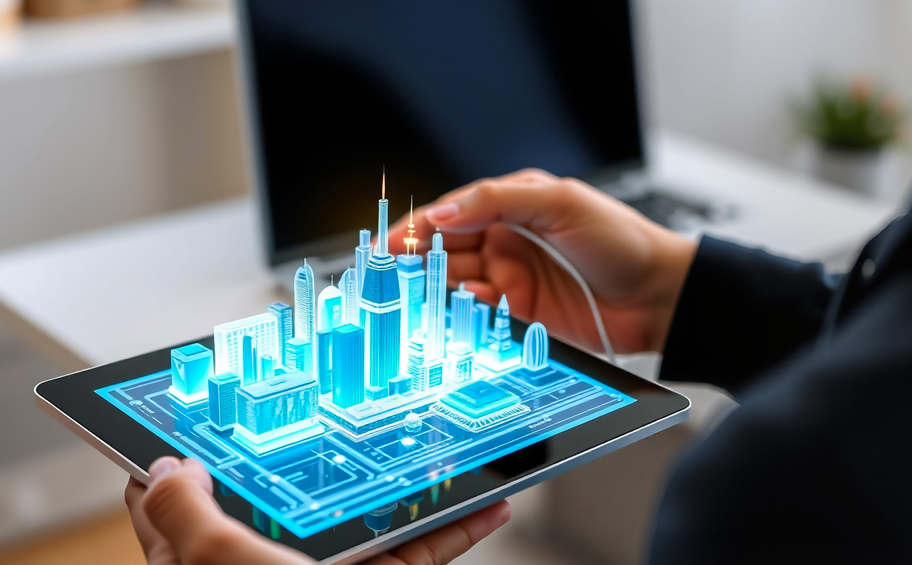The real estate industry is experiencing a major transformation, thanks to advancements in technology. From virtual property tours to artificial intelligence (AI) and blockchain, technology is changing how real estate agents, buyers, and sellers interact with the market. These innovations are making processes more efficient, transparent, and accessible, leading to a future where technology plays a critical role in real estate. Let’s explore some of the most impactful technologies shaping the future of real estate.
1. Virtual Reality (VR) and Augmented Reality (AR) in Real Estate
Virtual reality (VR) and augmented reality (AR) are revolutionizing how properties are viewed and experienced. VR allows potential buyers to take immersive virtual tours of properties from anywhere in the world, eliminating the need for in-person visits in the early stages of the buying process. AR, on the other hand, can overlay digital information on a physical space, enabling buyers to visualize what a home could look like with different furniture or finishes.
How VR and AR are shaping the future:
- Virtual property tours: Buyers can explore properties without having to visit them in person, saving time and broadening their options.
- Enhanced staging: AR allows agents to stage a home digitally, showcasing different layouts and design possibilities to buyers.
- Remote property purchases: International or long-distance buyers can make confident decisions about purchasing properties, thanks to detailed virtual tours and augmented experiences.
2. Artificial Intelligence (AI) and Big Data in Real Estate
Artificial intelligence (AI) and big data are playing an increasingly important role in real estate. AI can analyze vast amounts of data quickly, providing insights that help real estate agents make more informed decisions about property values, market trends, and client preferences. Additionally, AI-powered chatbots and virtual assistants can handle routine inquiries, freeing up time for agents to focus on higher-priority tasks.
AI and big data applications in real estate:
- Predictive analytics: AI can analyze market data to predict future trends, helping investors and buyers make smarter decisions.
- Personalized property recommendations: AI algorithms can match buyers with properties based on their preferences, improving the home search experience.
- Smart pricing tools: AI can assess historical data and current market conditions to suggest competitive pricing strategies for sellers.
3. Blockchain and Smart Contracts in Real Estate Transactions
Blockchain technology is introducing transparency and security to real estate transactions. Blockchain’s decentralized ledger system ensures that all transactions are recorded and verified, reducing the risk of fraud. Smart contracts—self-executing contracts with the terms of the agreement written into code—are also streamlining real estate deals. These contracts automatically execute once certain conditions are met, speeding up the buying process and reducing the need for intermediaries.
Blockchain and smart contracts benefits:
- Secure transactions: Blockchain provides a tamper-proof way to record property transactions, reducing the risk of fraud.
- Faster closings: Smart contracts eliminate the need for multiple parties to verify and approve each step of the transaction, speeding up the closing process.
- Increased transparency: Buyers and sellers can track the status of a transaction in real-time, increasing trust and transparency.
4. The Rise of Proptech in Real Estate
Property technology, or proptech, refers to the wide range of tech-driven tools and platforms that are transforming how real estate is bought, sold, and managed. From property management software to online listing platforms, proptech is simplifying many aspects of real estate transactions and management.
Proptech trends to watch:
- Online property platforms: Platforms like Zillow, Redfin, and Realtor.com are making it easier for buyers to search for properties and for sellers to market their listings.
- Property management software: These tools allow landlords and property managers to streamline maintenance requests, rent collection, and tenant communication.
- Smart home technology: More buyers are looking for homes equipped with smart technology, such as automated lighting, security systems, and energy management tools, making these features an attractive selling point.
5. Drones for Real Estate Marketing and Inspections
Drones are becoming a valuable tool in real estate marketing and property inspections. Drones provide aerial footage of properties, giving potential buyers a bird’s-eye view of homes, land, and surrounding areas. In addition to marketing, drones are being used for property inspections, particularly for large commercial real estate or hard-to-access areas.
How drones are used in real estate:
- Aerial photography and videography: Drones capture stunning images and videos that showcase a property’s exterior, landscape, and neighborhood in ways traditional photos can’t.
- Site inspections: Drones are used to inspect rooftops, large properties, or undeveloped land, providing detailed visuals without the need for physical access.
- Property marketing: Drone footage enhances property listings, making them stand out online and attracting more potential buyers.
6. 3D Printing and Its Impact on Real Estate Development
3D printing is making waves in real estate development by reducing construction time and costs. While still in its early stages, 3D-printed homes and buildings are becoming a reality, particularly in affordable housing projects. This technology allows developers to “print” homes layer by layer using various materials, leading to faster and more sustainable construction practices.
The future of 3D printing in real estate:
- Faster construction: 3D printing can significantly reduce the time it takes to build a home or structure, from months to just days.
- Cost savings: With fewer labor and material costs, 3D printing could lower the cost of building homes, making housing more affordable.
- Sustainable building: 3D printing can use eco-friendly materials and reduce waste, contributing to more sustainable real estate development.
7. Smart Homes and the Internet of Things (IoT)
Smart homes are becoming a must-have for many buyers, and the Internet of Things (IoT) is powering this trend. IoT devices like smart thermostats, lighting systems, and security cameras allow homeowners to control their properties remotely via smartphone apps. These smart home features not only enhance convenience but also increase energy efficiency and security, making homes more appealing to modern buyers.
Smart home technology benefits:
- Energy efficiency: Smart thermostats and lighting systems help homeowners reduce energy consumption, saving money on utility bills.
- Increased security: Smart locks and security cameras give homeowners peace of mind with real-time monitoring and remote access.
- Convenience: IoT devices allow homeowners to control various home functions, from heating to lighting, with just a few taps on their phones.
Technology is rapidly transforming the real estate industry, making it more efficient, transparent, and accessible for everyone involved. From virtual reality tours to blockchain-based transactions, these innovations are streamlining the buying and selling process, improving decision-making, and enhancing the overall experience for buyers, sellers, and agents alike. As technology continues to evolve, the future of real estate looks brighter and more exciting than ever.



